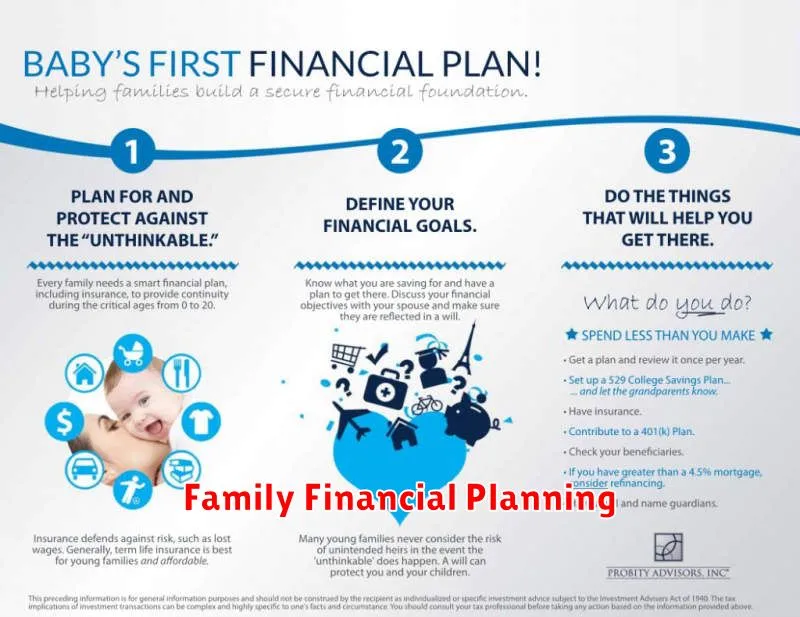Starting a family is an incredibly exciting time, filled with joy, anticipation, and, let’s be honest, a few butterflies about the financial aspect. Having a baby brings a whole new dimension of responsibility, and that includes ensuring you’re financially prepared for the journey ahead. But don’t let money worries overshadow the excitement – with a little planning and some smart choices, you can build a strong financial foundation for your growing family.
This comprehensive guide will walk you through the essential steps of financial preparation, from budgeting for baby and understanding the costs of childcare to managing parental leave and securing adequate life insurance. We’ll explore savings strategies, investment options, and provide actionable tips to help you navigate the financial waters of parenthood with confidence.
Why Financial Planning is Crucial When Starting a Family

Starting a family is an exciting and rewarding time, but it also comes with significant financial responsibilities. Financial planning is crucial to ensure a secure and stable future for your growing family.
Increased Expenses: Having children brings a myriad of new expenses, from diapers and formula to education and extracurricular activities. Planning for these expenses helps avoid financial strain and allows you to provide the best possible life for your children.
Future Needs: As your family grows, so do their needs. Financial planning enables you to anticipate future expenses such as a larger home, college tuition, or starting a college fund. By planning ahead, you can invest wisely and ensure you’re financially prepared.
Unforeseen Circumstances: Life is unpredictable. Financial planning includes establishing an emergency fund and securing adequate insurance coverage, protecting your family from the unexpected such as job loss, medical emergencies, or disability.
Financial Stability = Family Security: Financial planning provides peace of mind, knowing you are financially prepared for the journey of parenthood. This stability allows you to focus on what truly matters – raising happy and healthy children.
How to Estimate the Costs of Raising a Child
Estimating the cost of raising a child is a crucial step in financially preparing to start a family. It’s a daunting task, considering the ever-increasing cost of living and the many variables involved. However, understanding the key cost drivers can help you make a more informed financial plan.
Housing: Larger living spaces to accommodate a growing family often mean higher rent or mortgage payments. Factor in potential costs for renovations or moving to a family-friendly neighborhood.
Childcare and Education: Depending on your choices, childcare can be a significant expense. This includes daycare, babysitters, and eventually, education costs like tuition, school supplies, and extracurricular activities.
Food and Healthcare: As your family grows, so will your grocery bills. Healthcare expenses include regular checkups, vaccinations, and potential unexpected medical costs. Consider health insurance premiums and out-of-pocket expenses.
Other Essential Expenses: Don’t forget everyday necessities like diapers, clothing, toys, and transportation. As your child grows, these costs will evolve to include things like larger clothing sizes, technology, and extracurricular activities.
While these categories provide a good starting point, remember that every family’s situation is unique. Individual circumstances, location, and lifestyle choices will all play a role in determining the actual cost. Utilizing online calculators, budgeting tools, and consulting with financial advisors can provide a more personalized estimate tailored to your specific needs.
Building a Budget for Your Growing Family
Creating a comprehensive budget is the cornerstone of financial preparedness when welcoming a new member to your family. Start by diligently tracking your current income and expenses. This provides a clear picture of your financial baseline.
Next, anticipate and factor in the new expenses a baby brings, including healthcare costs, diapers, formula or breastfeeding supplies, and potential childcare if both parents plan to work. It’s wise to overestimate these costs to avoid surprises.
Identify areas within your current budget where you can cut back to accommodate these new expenses. This may involve reducing discretionary spending on dining out, entertainment, or subscriptions. Look for areas where you can save, such as negotiating lower rates for existing bills or finding more cost-effective alternatives.
Remember that your budget will need to evolve as your family grows and your needs change. Regularly review and adjust your budget to ensure it remains aligned with your financial goals. Building a solid financial foundation will provide peace of mind and create a more secure future for your growing family.
Saving for Education and Future Expenses
One of the most significant financial aspects of family planning is preparing for your children’s future, particularly their education. The cost of education has been steadily increasing, making it crucial to start saving early.
Consider opening a 529 plan, a tax-advantaged savings account specifically designed for education expenses. These plans offer significant tax benefits and can be used for a range of educational needs, from kindergarten to college.
In addition to education, think about other future expenses like extracurricular activities, hobbies, and even their first car. Creating a dedicated savings fund, separate from your emergency fund, can help you meet these financial milestones without derailing your overall financial stability. Remember, even small, consistent contributions can make a big difference over time.
The Importance of Health Insurance for Your Family

Preparing for a family involves much more than just buying diapers and cribs. One of the most crucial aspects of financial preparedness is securing adequate health insurance coverage for your entire family.
Health insurance provides a safety net against the potentially overwhelming costs of medical care. Unexpected illnesses, accidents, and even routine check-ups and prenatal care can quickly add up. Having health insurance ensures that you can access quality healthcare without jeopardizing your family’s financial stability.
Furthermore, health insurance offers peace of mind. Knowing you have coverage for yourself and your loved ones provides invaluable comfort, allowing you to focus on the joys of parenthood rather than the what-ifs of medical emergencies.
Creating a Financial Safety Net for Your Family
Bringing a child into the world is an amazing and rewarding experience. It also comes with added financial responsibilities. Creating a financial safety net provides stability and peace of mind as you grow your family.
Start by evaluating your current financial situation. Track your income, expenses, and debts. Identify areas for potential savings and create a realistic budget that accommodates future expenses like childcare and healthcare.
Building an emergency fund is crucial. Aim for 3-6 months’ worth of living expenses in a readily accessible account. This fund acts as a buffer against unexpected events such as job loss or medical emergencies.
Life insurance is vital, especially with dependents. Consider a policy that covers your family’s financial needs in case of your passing, including mortgage payments, childcare, and education costs.
While planning for the unexpected is essential, don’t neglect long-term financial goals. Continue saving for retirement and consider opening a 529 college savings plan to ease future education costs.
Long-Term Financial Planning for Your Family’s Future
As you prepare to welcome a new member to your family, long-term financial planning becomes more crucial than ever. Consider these key aspects:
1. Retirement Savings: Having a child shouldn’t derail your retirement goals. Continue contributing to retirement accounts and explore options like spousal IRAs if one partner takes time off work.
2. College Fund: Starting early with a 529 plan or other education savings account can ease the financial burden of college later. Even small contributions add up over time.
3. Estate Planning: Update or create your will, living will, and healthcare power of attorney documents. Designate guardians for your children in case of an unforeseen event.
4. Life Insurance: Life insurance provides financial security for your family in your absence. Assess your needs and consider both term and permanent life insurance options.
5. Emergency Fund: Unexpected expenses are inevitable. Aim for 3-6 months’ worth of living expenses in an accessible emergency fund to navigate financial challenges more easily.

